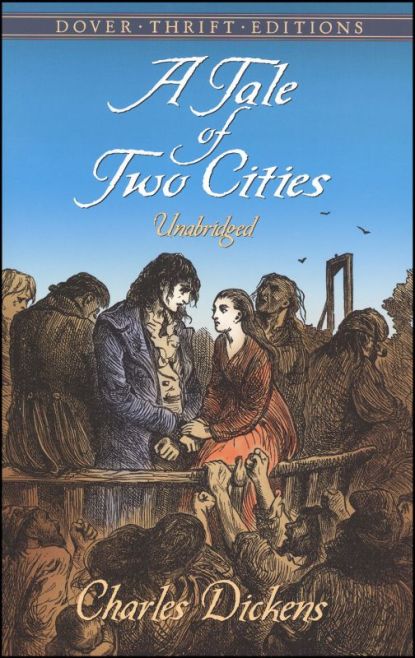
Classical Music Stories is a series that connects music to your favorite books and characters. Since listening to classical music can be like hearing a story (albeit an abstract one), imagining specific stories that match the music can make it that much more fun and accessible!
Like the last Classical Music Stories post on Anna Karenina and a Bach Cello Suite, you’ll probably recognize the opening of this one. I liked Mozart’s Symphony No. 40 in G minor K. 550 before (sometimes I really wish classical music had better titles), but once I started considering the similarities between it and A Tale of Two Cities the music became so much more powerful for me. MAJOR SPOILERS for A Tale of Two Cities lie immediately ahead so proceed with caution!
When I started pondering what story or character this music reminded me of, I focused on the opening. It sounds so anxious but also hopeful and noble, and especially when the beginning starts to repeat it seems to strive towards an ideal hope or happiness even more! But it never truly gets to a fully “happy” and peaceful state. That’s when I realized that the music sounded a lot like how I imagine Sydney Carton must have felt right before sacrificing himself for Charles Darnay. The opening theme makes it clear that he is (obviously) afraid to some extent of dying. Who wouldn’t be, especially in such a gruesome way? But his resolve can’t be shaken due to his love for Lucie, which gives him a hope and peace to keep circling back to when his anxiety threatens to overwhelm him.
Suddenly with a burst of louder, brighter music the outside world breaks into his focus as he sees the joyful, vibrant people around him (cruelly) excited to watch the traitors be executed. Their excitement become mingled with his own grim resolve.
The remainder of the piece alternates between what I imagine as Lucie’s sadness at Darnay’s and/or Carton’s impending death (in the sighing strings), Carton’s determination and devotion to Lucie, and tragedy as he gets closer and closer to his turn at the guillotine. The final notes of the piece sound like his death.
***
I often enjoy imagining stories to go along with classical music, but this one was particularly striking to me. The first time I imagined the music in this way I was moved to the point of tearing up (and honestly I’m not one to cry easily). Maybe it was something to do with my situation at the time (although I honestly can’t remember what was going on in my life at that point), or maybe I was particularly tired that day. Or maybe there really is something about experiencing the music as an illumination of Sydney Carton’s emotions and inner psychological state that the book doesn’t go into that really was that powerful. What I do know is that I found a new love of this piece and a new understanding and love of Sydney Carton that I didn’t get from just reading the book or just listening to the music.
No two people’s experience of the music or book (or music and book as imagined together) will be exactly the same, but did you find this story and music combination to be powerful, too? Or did the music make you imagine an entirely different story or have a different experience? Please let me know in the comments!
You can explore more Classical Music Stories here!

Love love love this!! Mozart and Dickens are a perfect combo in this one❤️❤️❤️
LikeLiked by 1 person
Thanks!! I’m really interested in whether other people hear the connection so that’s great to know. 🙂
LikeLiked by 1 person
I’m always on the fence about the names of classical music…on one hand, I want the poetic name, because I like words (the equivalent of a painting being labeled “untitled”.) On the other hand, sometimes I don’t like it named, because I don’t have the power of suggestion and then the piece can be anything I want it to be. Maybe there’s a freedom in not naming things? (Yes, I think too much, all the time…*laugh*)
LikeLiked by 1 person
Haha you’re talking to a fellow overthinker so no worries. Honestly I feel the same way! It’s a conundrum…
LikeLiked by 1 person